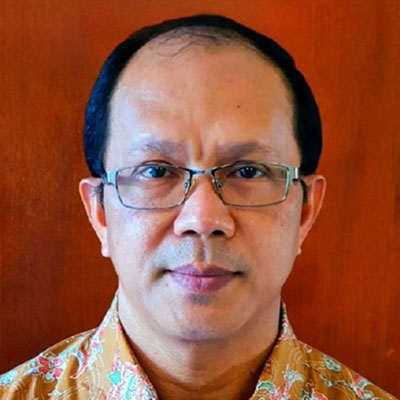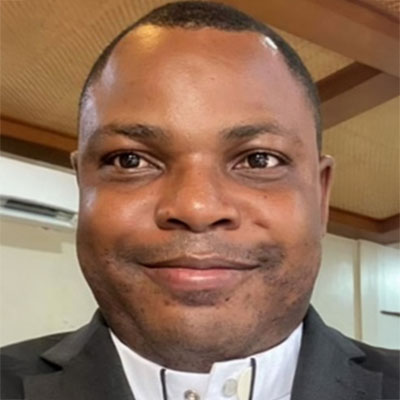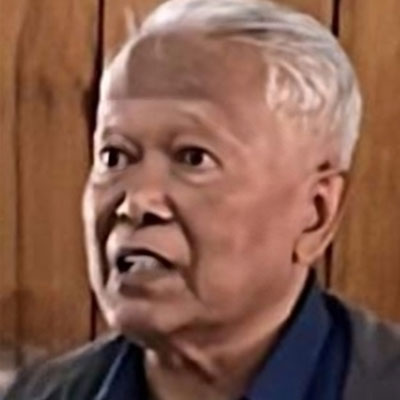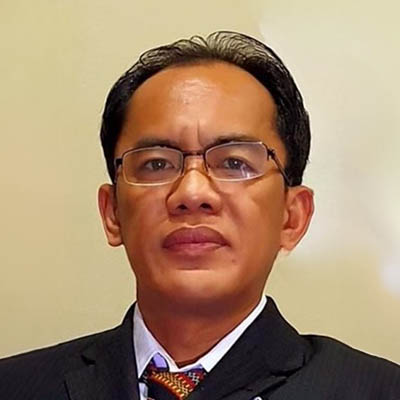
Jonel Dalimag, cicm
Missionary in the Philippines
Ongoing Formation sessions are already part of the tradition of the CICM. These are extraordinary occasions for confreres to share life and experiences as religious missionaries. These are also suitable investments for the Congregation in terms of animation, formation, and spiritual renewal. (This is a current reflections inspired by an ongoing formation I took part two years ago.)
In October of 2022, I participated in an Ongoing Formation Session organized by the General Government. With the theme "Cast into the Deep" (Lk. 5:4), the OF Session 2022 objective was to rekindle, revitalize, and deepen one's missionary vocation and spirituality. It was an invitation for self-aggiornamento amid the fast-paced changes in the world accelerated by the advances in sciences, information technology, and social media. This self-aggiornamento and renewal are rooted in our charism, spirituality, mission, and history and are well described and recorded in our beautifully written documents. Ongoing Formation is also an invitation for us to return to our documents. William Wyndaele, cicm, once wrote: "We do have our own wells for a CICM spiritual life, for a CICM spirituality. What we need to do is to drink from our own wells."1
The theme of the 3-weeks OF Session was itemized into weekly themes: To achieve the goal of renewal and self-aggiornamento The first week carried the theme "Speak Lord, you servant is listening" (1 Sam. 3:10). The second week went on with the theme "You are the Salt of the Earth" (Mt. 5:13); and the third week took off with the theme "New wine, new wineskins" (Mk. 2:22).
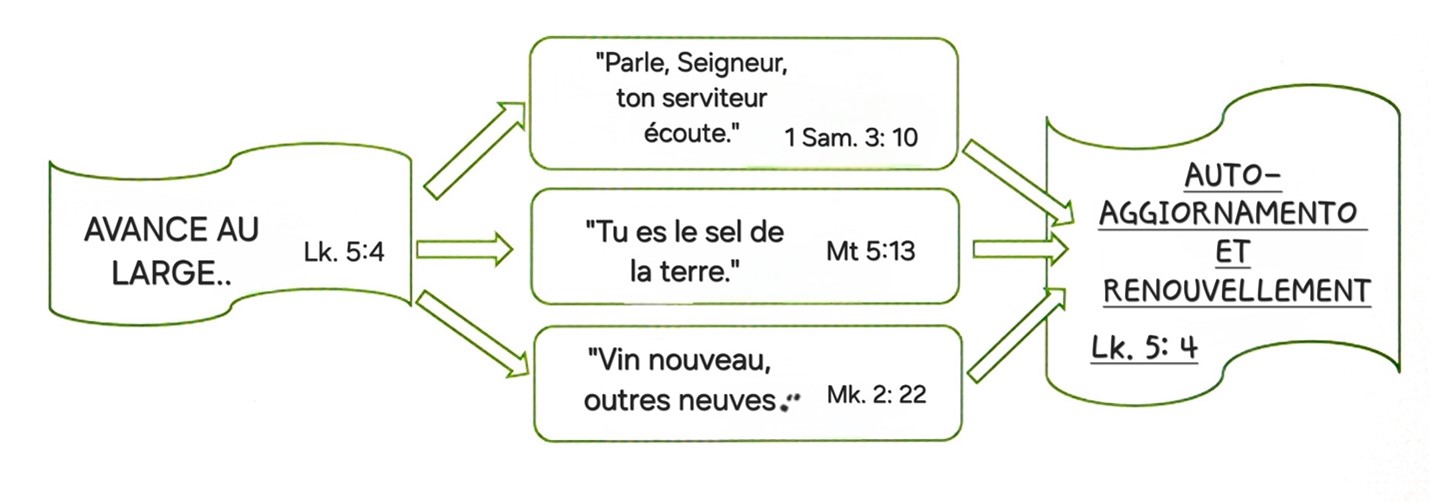
Speak, Lord, Your Servant is Listening
As religious missionaries, we often limit our understanding of God's voice to what is written in the Bible. When we take time to listen to God, we tend to only focus on passages from the Bible. Sometimes, we even concentrate on just one word or phrase. This method becomes so ingrained in us that it's our default setting whenever we engage in spiritual listening. This habit takes away from the missionary aspect of listening to the Lord speaking to us through human stories and the voices of nature. As missionaries, we interact with people regularly, and God speaks to us through their stories. In turn, we convey God's message to others through our own experiences.
During the first two days of the OF Session, Bp. Prudencio Andaya, Jr., CICM, D.D., the facilitator, led a recollection on the theme Rekindling the Fire and Living Out the Call Today. He emphasized the power of storytelling and story-listening in rekindling the flame of mission and living out our call in today's world. He highlighted the significance of stories in expressing the way and mind of God, linking people across generations, and ultimately connecting everyone to God. He suggested that our stories and God's stories are original experiences, and our 'image and likeness' may reside as part of the same story.2
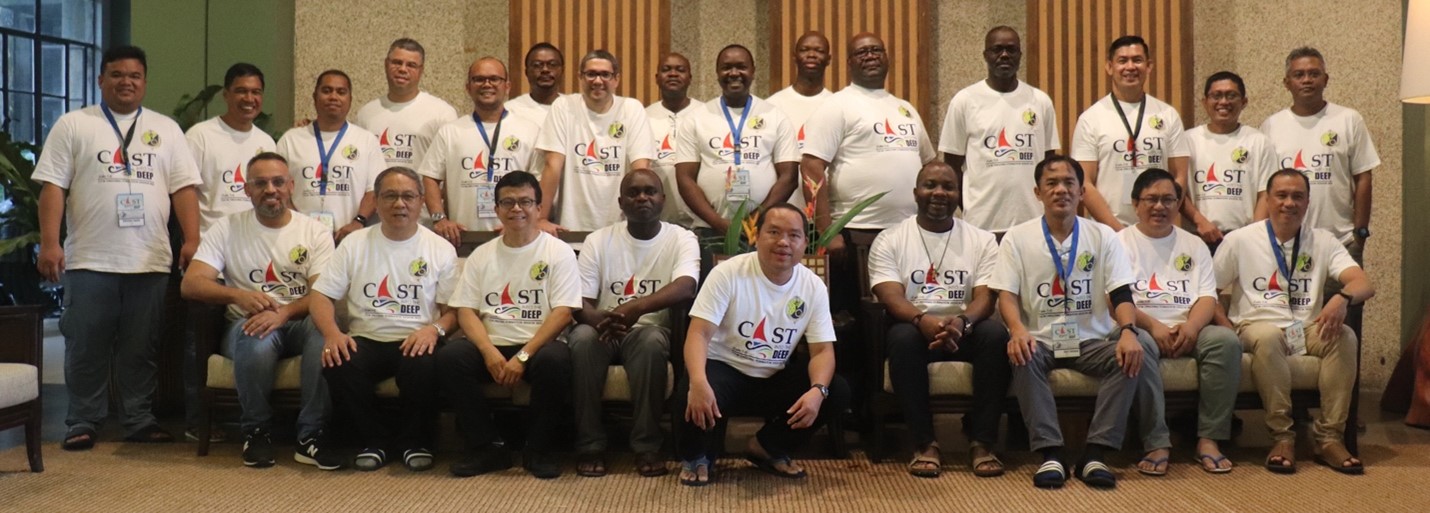
As CICM Missionaries, we take the Incarnate Word as the model of our charism, spirituality, and mission. We are constantly reminded to embody the cultures, stories, struggles, and joys of the people we serve. Our Kindling the Fire of 1974 emphasizes the shift from an ideal of a monolithic Church to one that unites different local churches in unity and tends towards greater incarnation. In CICM, the mission is defined as the joint participation of all faith communities in God's liberating action in history. The purpose of the mission is not the Church itself but the coming of the Kingdom in the world. Every ecclesial community has a historical vocation of service to the world, inspired by the Gospel and faith in the coming of the Kingdom of justice, love, communion, and peace. The Church writes history with them by working with diverse peoples to build a better world as God desires.3
In our missions, the concept of incarnation manifests in various missionary attitudes such as integration, solidarity, unity of heart and soul, community, internationality, interculturality, and multiculturality. The Acts of the 9th General Chapter in 1981 emphasizes the missionary attitude of integration as an essential element of our mission and spirituality:
“We are of different nations, but we meet each other from within the people among whom we live. It is to these people that our behavior and missionary deportment have to refer in order to make our integration as complete as possible. This demand implies that we go beyond the limits of our history and of our own culture. We should do everything possible to foster in ourselves an attitude of openness and listening that would allow us not only to give, but to receive as well, to go beyond our ways of thinking and to accept situations where we depend on the people and the local situation. More and more, we should deepen the implications of a real communion with the poor, of sharing their life style and willingness to be evangelized by them.”4
Indeed, the Lord speaks to us through the stories of the people we encounter, the events we witness, and, of course, through the Sacred scriptures.
You Are the Salt of the Earth
"You are the salt of the earth; but if the salt loses its flavor, how shall it be seasoned? It is then good for nothing but to be thrown out and trampled underfoot by men." (Mt. 5:13). If salt loses its flavor, how shall it be seasoned? The answer is ongoing formation!
Ongoing formation sessions are an integral part of life in CICM. These sessions are not just about new ideas and trends in religious missionary life. They are primarily opportunities for individuals to reflect on their personal journey and the mission of the Congregation. The goal of ongoing formation is to strengthen the essence of our missionary vitality so that we do not become "good for nothing and be thrown out and trampled underfoot by men."
Life is a journey, and our mission is also a journey. At some point, we may feel exhausted along this journey. There are times when life becomes unbearable due to excruciating pain, energy-sucking boredom, purposeless decisions and actions, and meaningless daily routines. When this happens, our natural inclination is to give up. Giving up means becoming complacent with life despite losing vitality and creativity. As we grow comfortable with this meaningless and purposeless existence, we fail to recognize the invitation to delve deeper into life, its potential, and opportunities. We lose our 'saltiness'."
The call to cast into the deep is not appealing anymore because we become too comfortable with life on the seashore. Life on the seashore is more appealing and relaxed because there are fewer risks or dangers, and the constant beauty of the shore, the smooth sands, and the waves wipe away all the footprints of our difficulties or problems. We feel good when the waves in the sand wipe out the imprints or traces of our problems. It gives us temporary relief. However, deep inside us, the loss of meaning and purpose is slowly sucking our energies, opportunities, and potential. The will to live meaningfully, be relevant, and make a difference in other people's lives is wiped out in us.
When life is too comfortable, we risk losing our daring to go the extra mile. Our fear of losing our security, comforts, and familiar routines in life deprives us of the joy of venturing into the unknown, the unfamiliar, and the undiscovered part of who we are. We discover more about who we are when we challenge ourselves to risk throwing ourselves into the deep, unknown, and unfamiliar place where we have no security other than our faith. We need to be disrupted by the ordinary and familiar things that we have always been doing that give us comfort and security. We need to be disturbed in our plans to see other options for us that we might have avoided for so long. "Disturb us, Lord, when with the abundance of things we possess, we have lost our thirst for the waters of life."
Let us not allow the comforts and securities in life to put out that flame or spark that has been with and in us. It is always tempting to stay where life is so easy. However, the fire of mission, service, love, and faith in us demands that we go beyond comforts and familiarity and journey toward the unknown and unfamiliar part of who we are. We need to journey within ourselves to rekindle the flame that sparked when we decided to take the path of the vowed life.
It takes a lot of courage to cast our lives into the deep, to go the extra mile, to do more, and to test the limits of our potential. Courage is indeed tough to gather and muster. However, if we are to be relevant in today's world, that is, to be the salt of the earth and make a difference in other people's lives, we need to muster that courage to cast into the deep. We get to know ourselves more by casting our lives into the deep. In facing our own demons, our darkness, and our issues, we get to find new directions and relaunch our lives with the best version of who we are. Duc in Altum is a journey to our deepest core. This journey allows us to revisit our motivations, inspirations, aspirations, values, and principles. In casting ourselves into this journey, our only securities are our HOPE and FAITH that overcome our FEARS and HESITATIONS. Others cannot do it for us. We must do it ourselves.
New Wine, New Wineskins
With time, our religious missionary vitality and intensity of service and dedication diminish, fade, or wane. We feel exhausted due to the monotonous life cycle of the mission. We feel drained of energy because we do not see any newness in our actions. We are not fruitful anymore. When we are in that situation of being unproductive, often, we tend to continue doing what we have been doing for so long without putting any meaning, significance, or relevance on it. We do them just for the sake of having something to do and not for the sake of the mission. Hence, self-aggiornamento is necessary. We need 'new wines in fresh wineskins.
Lifestyle wine and wineskin
Duc in Altum calls for disruption or a distraction of what we used to do. This Duc in Altum journey demands the attitude of LETTING GO, letting go of our comforts, securities, routines, plans, and projects to allow ourselves to discover more about life and its purpose and meaning. In letting go, we discover true FREEDOM, which fills our lives with purpose and direction. Freedom is discoverable when we break the trappings and chains that hold us from moving on. There is no freedom when there is fear of judgment or penalties. Freedom is a lifestyle. There is true freedom when we live a lifestyle that allows our energies and potential to flow freely and spontaneously. When we do things just because they are obligatory or because we want to impress our superiors, then we are not free. When we do things just because we fear that other people will judge us for not doing anything, then we are not free. However, freedom becomes a lifestyle when things are done as the spontaneous expression of who we are and what we are. LIFESTYLE IS MISSION! "Arise from your sedentary lifestyle to care for your brothers and sisters and bear witness to the Gospel of joy" (Pope Francis, April 22, 2022). "It is striking that even some who have solid doctrinal and spiritual convictions fall into a lifestyle that leads to an attachment to financial security or a desire for power or human glory at all costs, rather than giving their lives to others in mission. Let us not allow ourselves to be robbed of missionary enthusiasm!" (E.G. #80).
Love wine and wineskin
The beauty of casting ourselves into the deep is that we discover that the deepest core of who we are and what we are is LOVE. "Faith, hope, and love…all three, but the greatest is LOVE." We let go of things because we love them. We are free because we love. We hope because we love. We expressed our faith because we are loved. Love is not just an emotional thing to be felt but a commitment, a conviction, and a disposition to be lived, witnessed, and put into action. LOVE is MISSION! Love as a mission is not limited to our relationship with ourselves and others. Love as mission encompasses our relationship with nature, the living and the dead, the spirits around us, and the GREAT SPIRIT (the Creator). Love allows us to see the face of God in the faces of other people who are different from us. Love will enable us to recognize God in nature, in rivers and mountains, and lead us to act according to this recognition of God's Spirit in nature.
_______________________
1 Fr. William Wyndaele, cicm, CICM Spirituality, in EUNTES, No. 4, (1990) 14-24.
2 William Bausch, Storytelling: Imagination and Faith (Connecticut: Twenty-Third Publications, 1995), p. 15-16
3 Kindling the Fire, Acts of the 8th General Chapter (Albano, 1974), p. 47-51
4 CICM Missionary Presence, Acts of the 9th General Chapter (Rome, 1981), p. 30.
























